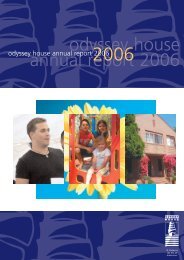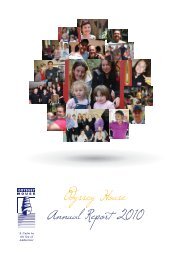ATS Literature Review, Consultations & Trial - Odyssey House
ATS Literature Review, Consultations & Trial - Odyssey House
ATS Literature Review, Consultations & Trial - Odyssey House
Create successful ePaper yourself
Turn your PDF publications into a flip-book with our unique Google optimized e-Paper software.
Amphetamine‐Type Stimulants: Development of a Treatment Protocol<br />
Within the AOD treatment area, CBT has been tested and utilised in relapse prevention (Marlatt &<br />
Gordon, 1985) and coping skills therapy (Monti, Abrams, Kadden & Cooney, 1989). The PsyCheck<br />
program, developed by Lee and colleagues (2007a) provides a CBT intervention for use in AOD<br />
services working with people with co‐occurring mental health problems.<br />
Lee and Rawson (2008) found a relatively small number of randomised control studies in the<br />
literature. Studies most commonly reported were studies of CBT and/or contingency management,<br />
with CBT trials showing reductions in methamphetamine use and other positive changes, even over<br />
short periods of time. The authors found it was not clear if gains associated with contingency<br />
management are sustained long‐term.<br />
3.8. Third Wave Therapies<br />
During the last two decades a number of therapies, under the name of the ‘third wave’ of cognitive<br />
behaviour therapy (CBT), have been developed. These include Acceptance and Commitment<br />
Therapy (ACT), Dialectical Behaviour Therapy (DBT), Cognitive Behavioural Analysis System of<br />
Psychotherapy (CBASP), Functional Analytic Psychotherapy (FAP), and Integrative Behavioural<br />
Couple Therapy (IBCT). They are grounded in an empirical, principle‐focused approach, and are<br />
particularly sensitive to the context and functions of psychological phenomena and thus tend to<br />
emphasize contextual and experiential change strategies in addition to more direct and didactic<br />
strategies (Hayes, 2004).<br />
Developed within a coherent theoretical and philosophical framework, Acceptance and Commitment<br />
Therapy (ACT) is a unique empirically based psychological intervention that uses acceptance and<br />
mindfulness strategies, together with commitment and behaviour change strategies, to increase<br />
psychological flexibility. Psychological flexibility means contacting the present moment fully as a<br />
conscious human being, and based on what the situation affords, changing or persisting in behaviour<br />
in relation to chosen values.<br />
Based on Relational Frame Theory 3 , ACT illuminates the ways that language entangles clients in their<br />
attempts to understand their own inner lives. Through metaphor, paradox, and experiential<br />
exercises clients learn how to make healthy contact with thoughts, feelings, memories, and physical<br />
sensations that have been feared and avoided. This helps the person to gain the skills to<br />
recontextualize and accept these private events, develop greater clarity about personal values, and<br />
commit to needed behaviour change.<br />
ACT gets its name from one of its core messages: to accept what is out of your personal control,<br />
while committing to do whatever you can to improve your quality of life. The aim of ACT is to help<br />
people create a rich, full and meaningful life, while effectively handling the pain and stress that life<br />
inevitably brings. It does this by:<br />
a) Teaching mindfulness skills to deal with painful thoughts and feelings effectively – in such a<br />
way that they have much less impact and influence over the person.<br />
b) Helping participants to clarify what is truly important and meaningful ‐ i.e. an examination of<br />
personal values ‐ then use that knowledge to guide, inspire and become motivated to change<br />
their life for the better.<br />
3 Relational Frame Theory is a psychological theory of human language and cognition, developed largely by<br />
Steven Hayes (who also developed Acceptance and Commitment Therapy) and Dermot Barnes‐Holmes. It is<br />
based on the philosophical roots of functional contextualism, and focuses on how humans learn language<br />
through interactions with the environment.<br />
Page 44 © Lynne Magor‐Blatch & James A. Pitts: <strong>Odyssey</strong> <strong>House</strong> McGrath Foundation 2008‐2009








